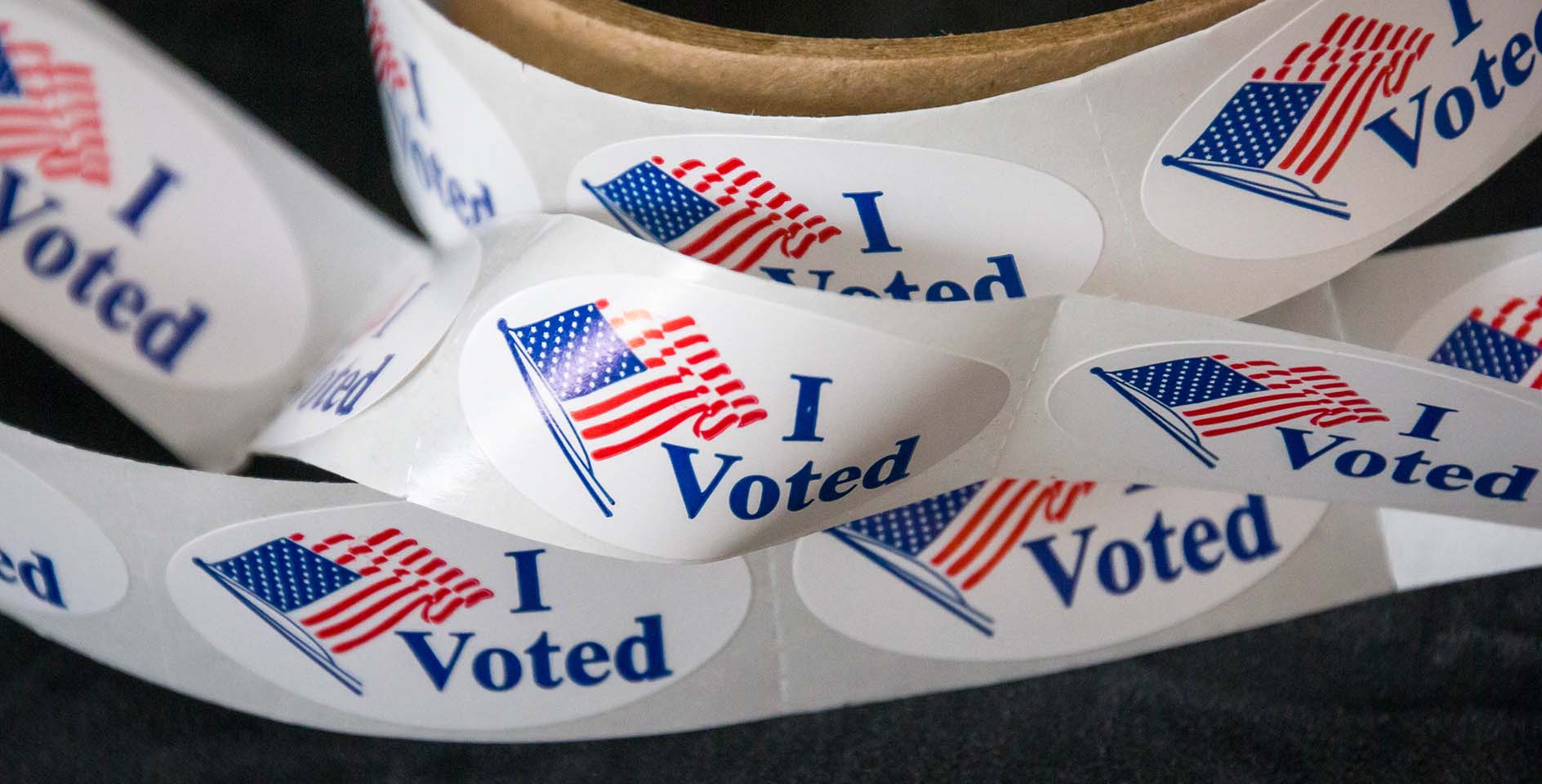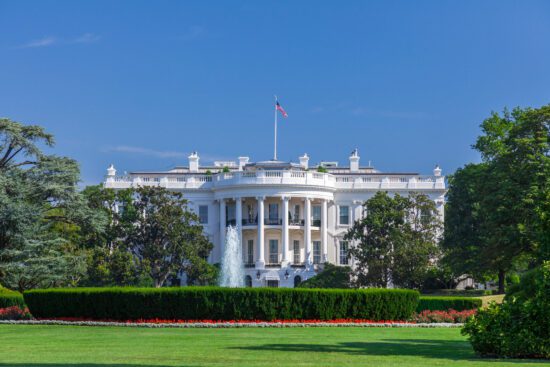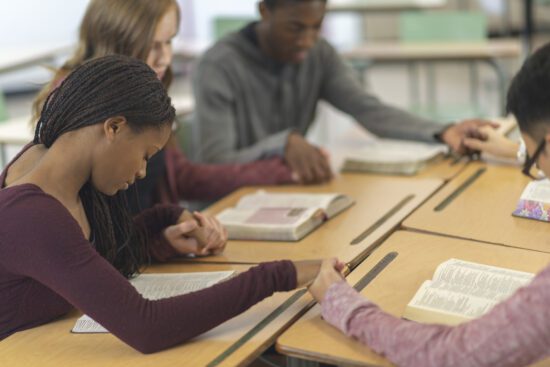In the leadup to the 2022 midterm elections, there will inevitably be a flurry of reporting on how evangelicals and Christians will vote. Given the polarized nature of politics in our culture, it is not uncommon for partisans to name particular policy positions as varied as tax incentives and carbon taxes as Christian positions with all the vitriol that comes from that. However, Christians should recognize that the way we engage the political process is not the same as the world around us. Daniel Williams, professor of history at West Georgia University, provides a helpful way forward in his new book The Politics of the Cross: A Christian Alternative to Partisanship. He was gracious enough to answer some questions about how Christians can avoid the partisanship and tribalism so common in our political discourse, and what a distinctly Christian approach can look like.
Ethan Lamb: This work is different from your previous books which focus more on history than political theology and public policy. What led you to write this particular book, and how did your training as a historian inform the work?
Daniel Williams: In a sense, The Politics of the Cross is the culmination of research that I have been conducting for the past 20 years. Most of my previous scholarship has focused on the way in which Christians applied their faith to political issues during the past few decades in the United States, and the picture that emerged from it was considerably more complicated than many theologically conservative Christians today might assume. My first book, God’s Own Party, was a history of the Christian Right that noted that Christians who made an alliance with the Republican Party found it more difficult to change the culture through politics than they had expected. My second historical monograph, Defenders of the Unborn, traced the beginning of the pro-life movement to liberals who combined their concern for unborn human beings with a commitment to expanding the social welfare state. My most recent historical monograph, The Election of the Evangelical, explored the 1976 presidential election, when the born-again Southern Baptist presidential nominee was a Democrat. The Republican Party has not always been the preferred home for theologically orthodox Protestants, nor has it delivered on its promises for many of the conservative evangelicals who have embraced it.
But you’re also correct in noting that although The Politics of the Cross is grounded in research that I did for some of my previous books, it’s a very different type of work in the sense that it is the first book that I have written directly for a Christian audience. As both a Christian who actively participates in a local church and a history professor who teaches a wide variety of students, I have many opportunities to discuss politics with Christians across the ideological spectrum. It occurred to me, especially after the election of Donald Trump, that most Christians who have talked with me about politics have misunderstood the political process. Pro-life Christians who decry Roe v. Wade, for example, often have a very fuzzy understanding of who gets abortions in the United States today, what the trendlines in abortion rates are, and what will happen in state law if Roe v. Wade is overturned. And that’s only one example of a much broader phenomenon.
Christians who are partisan loyalists are often entirely unaware of the ways in which the party they oppose might also be rooted in Christian principles, even if those principles have been distorted. Too often, Christians have settled for campaign slogans rather than careful policy analysis. They have also often lacked a clear sense of what politics can (and cannot) accomplish, and what it would mean for their political approach to be clearly linked to Christian principles that go beyond merely moral regulation. I wrote The Politics of the Cross to bring together insights from history, political analysis, biblical exegesis, and theological study that I thought would prompt Christians to reexamine their political assumptions, no matter what they might be.
EL: In your chapters on the changes within the two major parties, you note the importance of religion in both of them throughout their history. How has that relationship shifted over time for each party?
DW: The Republican Party has always been a party of Protestant morality. It had its origins in a Protestant-inspired moral cause: restricting slavery. In the late 19th century, it attracted many temperance advocates and others who believed in using the state to promote personal moral virtues that were important to many American Protestants at the time. For much of the 20th century, it was the preferred party of mainline Protestants, in the late 20th century, it became the party of white evangelicals, whose own moral causes — especially opposition to abortion and same-sex marriage — made their way into the party platform.
Over the past 20 years, the Christian Right has become an increasingly dominant voice in the Republican Party, and GOP platforms have become more overt in their Christian references and condemnations of abortion. Approximately 80% of white evangelical voters support the GOP. Yet some Christians have rightly questioned whether the civil religion of the Republican Party — which is strongly opposed by most Black Christian voters — is really a reflection of the evangelical Christian faith or is instead a Christian nationalist distortion of it.
The Democratic Party, in keeping with its origins as the party of yeoman farmers and the working class, adopted a social vision in the 1930s that closely paralleled Catholic social teaching and the liberal Protestant Social Gospel. For more than half a century, the Democratic Party has been influenced by Black Protestantism, Reform Judaism, and socially progressive Catholicism, but its primary religious influence has been liberal Protestantism. Indeed, even today, the politically oriented articles in a liberal Protestant journal such as Christian Century correspond closely to the views of progressive Democratic politicians. Like liberal Protestantism, the Democratic Party champions a social version of morality that contrasts with the individualistic emphasis of the Republican Party and many white evangelicals. Whereas conservatives tend to think of moral regulation as a way to curb individual vices (whether alcohol in the early 20th century or abortion in the early 21st), progressives tend to see moral regulation as a way to promote equality and correct social evils, such as structural racism.
The Democratic Party’s platform still closely corresponds to liberal Protestant political pronouncements, but today white Democrats are significantly less likely than they once were to attend church, with nearly half never attending at all. The liberal Protestant values of the Democratic Party have thus been secularized, leading some conservative Christians to view the Democratic Party as a godless party. Yet the Democratic Party’s Hispanics – and, to an even greater extent, its African Americans – are still highly religious for the most part, and they often see their commitment to the Democratic Party as an extension of their own religiously inspired interest in social justice, even as a significant number of both Protestant and Catholic Christians question how the Democratic Party’s commitment to abortion rights and the rights of LGBTQ+ individuals can be squared with historic Christian teachings.
EL: One of the themes of the book is that there are dangers to fully identifying with either party. What are the particular pitfalls that you foresee for Christians within each group? Are there ways to avoid this?
DW: Both political parties have historical roots in Christian principles, but both parties have distorted those principles.
Christians who are partisan Republicans are in danger of making a selective version of morality a substitute for a consistent application of God’s principles. Over the past 40 years, the Christian Right has said far more about homosexuality than divorce or premarital sex, and far more about abortion than about the destruction of human life in any other context. At the same time, Christians who have been attracted to the Republican Party’s message have tended to think that moral regulation without personal sacrifice can curb sinful activity. They have thus advocated abortion restrictions without supporting more costly expansions that would likely be necessary to deter low-income women from having abortions.
Christians who are partisan Democrats are in danger of excusing (or even embracing) their party’s stances on abortion, gender identity, and same-sex sexual activity, all of which are clearly at odds with historic Christian teachings and biblical precepts. It has been clear for decades that a Democrat cannot get the party’s nomination — and, in most cases, cannot even be elected to Congress or statewide office — without embracing a platform that is in conflict with a historic Christian understanding of these matters.
But perhaps the greatest danger for partisan Christians is that by identifying a particular party with the kingdom of God, they will minimize the theological principles that should be the greatest concern for Christians: the atoning death of Jesus, the resurrection, and the need for God’s grace to eradicate the sin that dwells in all of us. Neither party has any room in its platform for a biblical understanding of original sin. As a result, a Democratic partisan is likely to feel much more comfortable talking about the parable of the Good Samaritan or the prophetic injunction to “let justice roll down like waters” than reading Isaiah 53 or the first few chapters of Romans. A Republican partisan will be comfortable talking about (selective) moral regulation, but may deny the degree to which sin pervades our social structures, as well as our hearts.
Christians can avoid these temptations by viewing parties as strategic tools rather than sources of identity. A Christian who decides to vote for a candidate of either party may have valid, biblically centered reasons for making that choice, but should still be wary of the dangers of identifying too closely with either party. Christians need to avoid making either party a source of their identity or a litmus test for Christian faithfulness. That does not mean that the two parties are equal, and that it does not matter which option we choose. But it does mean that Christians should seek to transcend both parties in their thinking, and they should be understanding of their brothers and sisters in Christ who make different political choices. If, in the end, both parties are imperfect political choices at best, we have to adopt a critical stance toward both parties even while extending a grace-filled understanding to Christians on both sides of the aisle who make political choices with which we might disagree.
EL: At several points, you differentiate between a focus on changing laws and changing hearts or the culture at large. How have Christians often misunderstood the importance of these two emphases?
DW: Laws tend to be effective only when they reflect widely-shared beliefs. A moral regulation that is passed by a narrow majority over the objections of a sizable percentage of the population is not likely to last very long. Evangelical Christian political campaigns have too often focused on enacting laws rather than changing cultural attitudes. But historically, legal changes that were not accompanied by a widespread change in cultural attitudes were easily circumvented. The most famous example of this is probably Prohibition, but one can find a host of other examples as well.
Christians who oppose abortion should therefore not only focus on changing the Supreme Court to overturn Roe v. Wade, but should also think about how to change American attitudes to create a culture of life, so that if abortion is restricted, the change in law will be more likely to have a lasting effect. If Christians realize that laws are most effective only if they are the final step in ratifying a cultural shift in attitudes that have already taken place — as, I would argue, the civil rights legislation of the 1960s was — they will not have unrealistic expectations for what a change in law can accomplish, and they may recognize that a single-issue litmus test is not the only way to advance their policy goals, even on an issue as important as the protection of unborn human life.
EL: One of the most interesting sections of the book is your vision of what would happen in the vent that Roe v. Wade is overturned. How important is it for activists of all issues to assess the short- and long-term consequences of the policy initiatives that they’re fighting for, and to plan for them accordingly?
DW: I think that it’s vitally important to move past political slogans and have a clear understanding of the likely results of every policy that we support or oppose.
In the case of abortion, I think that too many pro-life Christians have naively assumed that the reversal of Roe v. Wade would mean the end of legal abortion in the United States or would drastically reduce the abortion rate. In actuality, the states that currently offer the most abortions will continue to do so if Roe is overturned, and abortion will be almost as widely available as it is now. This is especially true if we also consider the number of abortions that occur at home through the use of chemical abortifacients, which are widely used in parts of Latin America where abortion is illegal, and are becoming increasingly common in the United States, even in states that tightly regulate surgical abortion. If we really want to create a culture that protects unborn human life, we have to look beyond abortion regulation and consider economic and healthcare changes that might incentivize more women to choose life for their unborn child.
The majority of women who have abortions in the United States today are low-income mothers in their 20s or 30s. Surveys of these women have shown that economic considerations are central in their decision to terminate their pregnancies. One could make a case, therefore, that political initiatives that equip these women to provide for their children are pro-life policies that could save unborn human lives, even if they are not billed as such. Christians who want to vote pro-life need to consider not only what effect their vote will have on abortion law but also how the policies they support will affect the abortion rate.
EL: Two of the most religious groups in America (white evangelicals and African American women) vote for different political parties even though they share similar convictions about the authority of Scripture and the importance of faith, as well as exercising similar levels of religious behavior. How should Christians respond to this difference? And what does it evidence about the state of racial justice in America?
DW: African Americans (and especially African American women) pray more, attend church more often, and read the Bible more than any other group of people in the United States, and their faith deeply influences their political choices. Unlike many white Christians, African American Christians believe that the concerns of the poor and marginalized are central to a biblically-grounded politics. They overwhelmingly believe that the Democratic Party’s support for a higher minimum wage, expanded national healthcare programs, and policies to address structural racial discrimination are a better reflection of their values than the Republican Party’s policies are.
White theologically conservative Christians tend to place far more emphasis on individual moral regulation in their politics — which means that they tend to see abortion as an issue that should be address with legislation to restrict individual behavior rather than with social programs to provide a safety net for low-income women facing crisis pregnancies. White Christians who vote Republican sometimes believe that Christians who vote Democratic are committing the sin of supporting abortion and homosexuality; Black Christians who vote Democratic sometimes believe that their white counterparts who support the Republican Party have no interest in racial justice or the concerns of the poor.
I think that Christians on both sides of this political divide need to listen to the concerns of their brothers and sisters in Christ with whom they might disagree politically. Both sides have valid concerns; defending the lives of unborn people who have been created in the image of God is important, and so is defending the lives and well-being of a people group that has faced centuries of racial discrimination and that still has a disproportionately high number of people trapped in poverty.
For white conservative Christians to be able to learn from the perspective of the vast majority of Black Christians, they need to be willing to consider the possibility that economic and legal structures may exist that make it difficult for large numbers of hard-working people to escape from poverty, and they need to be willing to consider the idea that God is concerned about these economic and legal structures because God cares deeply about the poor. Once we admit these possibilities, we may find that those of us who are white can learn a lot from African American Christian critiques of white conservative politics — even if we still value the concerns about unborn human life and sexual morality that characterize the views of many white Christians who vote Republican.
EL: You argue that the key for addressing many of these issues might be found in how we address poverty and treat the poor. Why do you think this particular issue is important for Christians to get right, and how have we lost a sense of collective sacrifice? How does a correct theology of this have an effect on the other issues that you cover in the book?
DW: By at least one count, there are 2,000 verses in the Bible that discuss God’s concern for the poor — including a number that come from the lips of Jesus himself. Given the pervasiveness of this message in every section of the Bible, this is a subject that every Christian who cares about the concerns of God needs to care about deeply. But beyond that, I think that we’ll find that if we orient our political policies around the needs of the poor, we’ll be able to more effectively address many of the other political issues that we care about, including abortion, defense of marriage, and racial justice.
Too often, politically conservative Christians have assumed that they can effectively fight social evils through legal prohibitions. The only solution to abortion is to make it illegal, they think. The only solution to social disrespect for marriage is to enshrine a Christian definition of marriage in public law. But in reality, real social change may require a much deeper sacrifice. If we really want to reduce the abortion rate, for instance, we need to ask the question why abortion rates have remained stubbornly high for women below the poverty line, even as they have fallen drastically for the middle class.
Is it possible that economic empowerment of low-income pregnant women might be a key to saving unborn lives? And is it possible that this form of economic empowerment might require something like higher taxes, larger increases in healthcare premiums, or even greater rates of inflation in order to finance the expansions in healthcare, college tuition benefits, and minimum wage increases that will be necessary to lift the working poor out of poverty? And this might be only the beginning of the personal sacrifice that might be required to address the needs of those trapped in poverty. Much of this personal sacrifice can take place through personal interaction with the poor and charity on a local level, but some of it will need to take place in the national political arena as well.
In the Old Testament law, God provided for Israel’s poor by ensuring that they had access to debt forgiveness, recovery of their family’s land lots that they might have lost, and a means to support themselves even when they temporarily had no land. In other words, God ensured that every person in Israel, no matter how poor, would have access to a means of providing for their families through meaningful work and a means of escaping the long-term burdens of debt. I think that a humane policy toward the poor would involve the same principle today. If we can make sure that all people in the United States have the opportunity to support their families through meaningful work while also avoiding the crippling burdens of debt, we will be well on our way toward treating the poor with the dignity and respect that God accords them.
And when we do that, we’ll likely find that some low-income women who resort to abortions because they believe that they do not have the means to provide for their children will no longer feel the need to terminate their pregnancies. We’ll find that some low-income unmarried couples who have thought that marriage was out of reach because of their economic situation will feel empowered to get married. We’ll find that the systemic wealth inequality that has fallen along racial fault lines is at least partly alleviated — and with it, some of the inequities in the criminal justice system that make it much more likely that poor people of color will go to jail.
EL: You take issue with the single-issue voting policies of the right and the left. How should Christians think through the moral choices that face them when they enter the voting booth?
DW: Single-issue voting usually rests on the assumption that there is one social evil that is so egregious that its importance outweighs everything else, and that that one social evil can be addressed effectively through a change in law. But if we understand the pervasiveness of sin from a Christian perspective, we’ll realize that social evils are much more numerous, widespread, and intractable than a single-issue approach to politics suggests. The problems of drunkenness were not solved with Prohibition, nor were the problems of racial injustice solved with the 13th Amendment, which outlawed slavery. That certainly does not mean that the 13th Amendment was not needed, but it does suggest that solving the lasting problems created by the slave trade required a more lasting (and costly) commitment to justice than the single-issue politics of antislavery could address through one constitutional amendment.
In the same way, the concerns of Christian voters who embrace single-issue politics today are usually well founded, but they often greatly overestimate the ability of public law to eradicate the particular evil that they oppose, and they overlook the many other social evils that their single-issue political focus might ignore.
Instead of focusing on a single issue to the exclusion of everything else, I would encourage Christians to ask the question: In a world of imperfect choices, which political choice offers the best chance for me to show love to my neighbor by moving my society a little closer to the principles of God? This is a holistic approach that encourages us to consider probable outcomes of policy applications instead of merely settling for political slogans.
EL: Throughout the book, you emphasize that Christians must let go of blind partisan loyalties in order to practice cross-centered politics, which requires supporting policies and values from both sides of the political spectrum. What are some of the practical methods that you believe would help Christians to let go of blind partisan loyalties in today’s hyper-polarized social climate?
DW: I think that we need to begin by recognizing that cross-centered politics is self-sacrificial, not self-defensive. It seeks to show love for our neighbor rather than defend our own interests. It also recognizes God’s sovereignty and the fact that real transformation comes not through a political campaign but through the direct work of God. And it recognizes that sinful assumptions have shaped the platforms of both major political parties.
A recognition of these principles is the key to a charitable disposition toward Christians who make political choices that differ from our own. It is also the key to looking more critically at our own political party and beginning to view a vote for a party merely as a tool (a means to an end), not a marker of identity or an end in itself.
Christians who vote Democratic will recognize that while they might applaud their party’s stance toward the poor and racial minorities, the Republican Party’s platform statements on the value of unborn human life are much closer to historic Christian teaching than the Democratic Party’s statements are — which will lead them to a greater appreciation for Christians who vote Republican for the right reasons, even if this is a stance they do not share themselves.
And Christians who vote Republican can learn a lot from the perspectives of the millions of Christians (especially many African American and Hispanic Christians) who have made a plausible argument that the GOP’s stances on healthcare, minimum wage, and immigration will lead to outcomes that are much further removed from biblical ideals of a just society than the Democratic Party’s policy stances on those issues are.
Christians on both sides of this political divide can learn from those with opposing views and can appreciate the fact that what they differ on is usually the application of biblical principles rather than the principles themselves. Theologically conservative Christians who vote Democratic may not approve of abortion, and Christians who vote for Republican candidates do not want to hurt the poor and promote racial injustice. Once partisan Christians on both sides of the aisle realize that, they may become less partisan — and may also arrive at a greater appreciation of their brothers and sisters in Christ who make different choices at the voting booth.
And if Christians in both parties realize that they can support a policy outcome without necessarily endorsing all of a party’s rhetoric, they will be better positioned to adopt a more holistically-minded, nonpartisan mindset, even if they end up voting for one particular party most of the time. A Christian may have good reasons for favoring one party over the other — but I would hope that even Christians who consistently favor one particular political party would have the biblically-centered, discerning mindset to recognize areas in which their favorite party does not line up with Christian principles and that they would also respect other Christians who believe they have godly reasons for making a different political choice.










